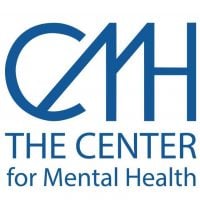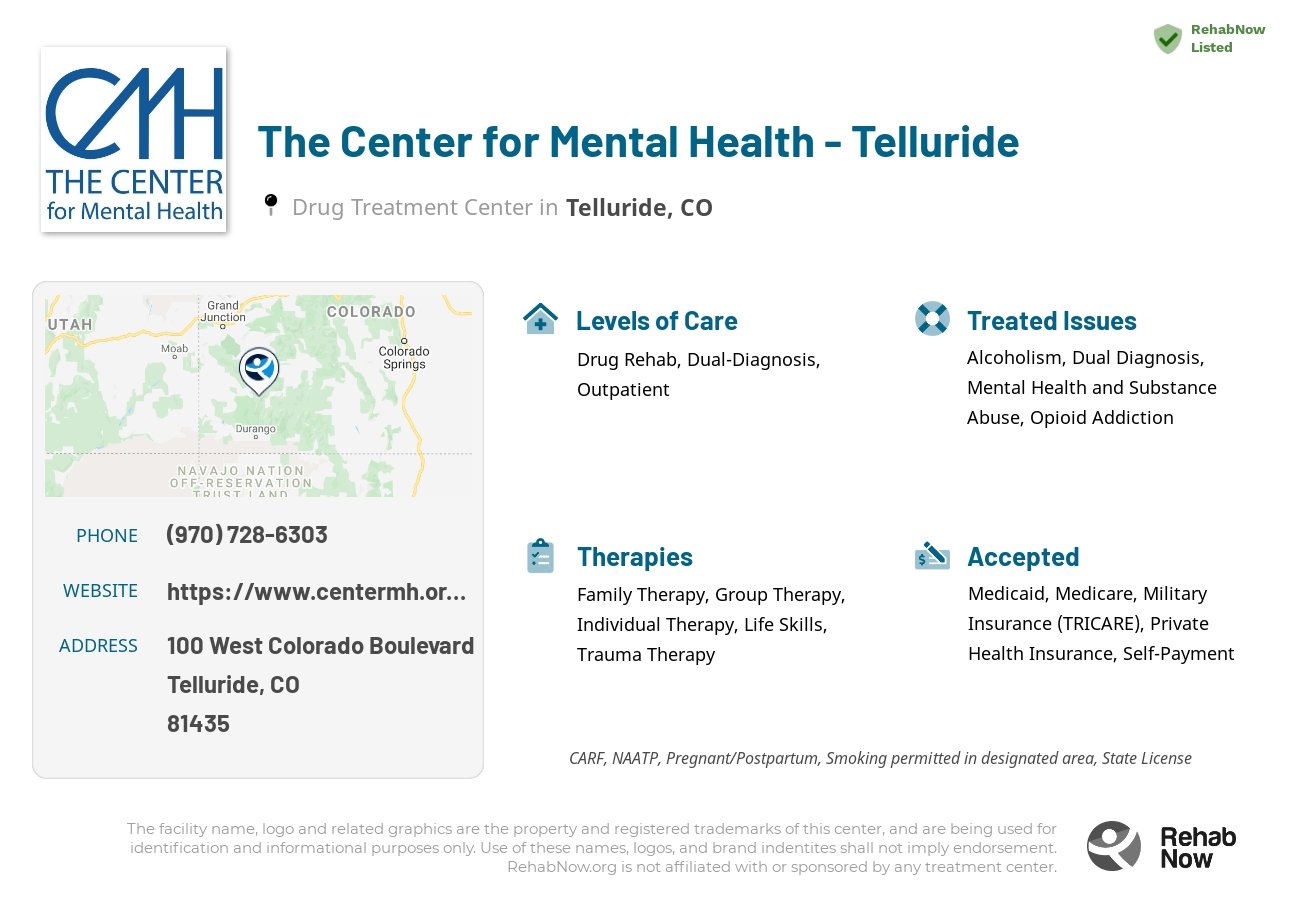The Center for Mental Health - Telluride
Drug Rehab Center in Telluride, Colorado
The Center for Mental Health - Telluride is a nonprofit addiction treatment facility in Telluride, Colorado that offers comprehensive care and evidence-based treatment modalities for individuals suffering from addiction.
About The Center for Mental Health - Telluride in Colorado
The Center for Mental Health - Telluride is a nonprofit addiction treatment facility located in Telluride, Colorado. Founded in 1964, the facility offers a range of services for individuals suffering from Drug Addiction, Alcoholism, Opioid Addiction and Dual Diagnosis. The facility accepts Private Health Insurance and offers a range of Drug Rehab, Outpatient Levels of Care and Dual-Diagnosis levels of care to meet the needs of each patient. The Center for Mental Health is proudly affiliated with The Center for Mental Health and is licensed by the state of Colorado and accredited by the Joint Commission.
The Center for Mental Health - Telluride strives to ensure their patients have the most comprehensive care throughout their treatment program. The facility employs a team of highly-trained and qualified professionals to help create an individualized treatment plan tailored to the needs of each person. They provide evidence-based treatment modalities such as Cognitive Behavioral Therapy (CBT), Dialectical Behavioral Therapy (DBT), Motivational Interviewing (MI) and Contingency Management (CM). Additionally, The Center for Mental Health - Telluride provides support to families and aftercare services to ensure continued sobriety after completion of treatment.
Genders
Ages
Modality
Additional
Conditions and Issues Treated
Opioid addiction starts when a person becomes addicted to legal or illegal opioids. The addiction can happen quickly, in just a matter of days. Opioid withdrawal can be extremely uncomfortable and lead the user to continue to use even if they want to quit. Stopping using an opioid requires medical observation. Sometimes inpatient treatment with a medically supervised detox is necessary for managing the withdrawal process while learning lasting tools for maintaining recovery. Medications may be used in some cases of opioid addiction.
Opioid addiction is one of Colorado‘s most prominent forms of addiction. It’s treated by detoxifying the body so that the chemicals from the medications no longer impact them and by therapies to correct behavior and target the root of the problem.
Recovery is not simply about stopping drug use. Recovery is working with addiction while recovering mental health issues that are fueling the addiction in the first place.
Levels of Care Offered
This center offers a variety of custom treatment tailored to individual recovery. Currently available are Drug Rehab, Dual-Diagnosis, Outpatient, with additional therapies available as listed below.
Outpatient treatment is considered the lower intensity level of addiction treatment. It’s ideal for early phase addiction or lower intensity addictions. It may include weekly sessions instead of daily. It may include weekly sessions instead of daily. Peer group support, 12-step programs, and individual counseling may still be involved but at a lesser frequency than an intensive outpatient program. It is a good choice for someone who doesn’t need to go through a medically supervised detox and who has a supportive home environment. It requires motivation and dedication to commit to the program without constant monitoring.
Therapies & Programs
Individual therapy involves one-on-one sessions between the patient and therapist. It provides patients with a safe environment to openly discuss personal and sensitive issues with the therapist. They find the therapist as someone they can trust. Individual therapy aims to identify the core issues that would have led the patient to substance abuse and address them effectively. The therapist can develop patient-specific customized solutions through individual therapy, which aids speedier recovery.
Family therapy is a group problem-solving that aims to improve communication and relationships between the addict, their family, and sometimes friends. The main goal of family therapy for drug addiction is to create an environment where communication can occur without judgment, hostility, or blame. The therapist is with the family as they learn to communicate differently, especially with the addict when s/he is using. The family can learn to reduce their enabling behavior or rally together and support each other during tough times.
An addict’s family can play a vital part in helping them to avoid relapse because they can spot the warning signs and help them get back on track before it becomes too much of a problem. Family therapy is one of the most effective ways to help addicts stay on the path to long-term sobriety. When a drug addict decides that they want to try and get sober, it takes the support of every person they love to succeed. It can be incredibly difficult for loved ones to watch an addict go through the pain and suffering of withdrawal, but by being there with them and supporting them, they can help to make sure that the addiction never returns.
Groups typically involve meetings with other recovering addicts who can relate to one another’s experiences. They might meet in person or online and typically focus on the process of staying sober rather than overcoming a specific addiction.
In these groups managed by The Center for Mental Health - Telluride, addicts can build a sense of community and develop strong emotional connections with others who understand what they are going through. These beneficial relationships can help addicts overcome their cravings and prevent relapse at any point during the recovery process.
In general, trauma therapy is a clinical process that helps individuals deal with mental stress often caused by traumatic events. The therapist helps the person identify, understand, and work through the problem. This is done with the help of talking about it in group or one-on-one counseling sessions. Therapists use relaxation, role-playing, art, and music to help the person open up about what is bothering them.
There are many different types of trauma therapists, such as psychiatric nurses and counselors. Not everyone is a good candidate for this type of therapy; it is generally reserved for people who have recently experienced a traumatic event and struggle to get over it. It is often done for children, teenage victims of sexual assault, and war veterans.
Since addiction is a chronic physical and mental illness, addicts need to learn as many life skills as possible. Many drug treatment centers offer life skills activities as part of their addiction recovery programs. Examples include cooking classes, employment training, resume writing seminars, parenting classes, and computer training. Life skills activities help addicts find employment, take care of their families, and give back to the community.
Payment Options Accepted
For specific insurance or payment methods please contact us.
Is your insurance accepted?
Ask an expert, call (888) 674-0062
The Center for Mental Health Associated Centers
Discover treatment facilities under the same provider.
- The Center for Mental Health - Montrose in Montrose, CO
- The Center for Mental Health - Delta in Delta, CO
- The Center for Mental Health - Norwood in Norwood, CO
- The Center for Mental Health - Gunnison in Gunnison, CO
- The Center for Mental Health - Ridgway in Ridgway, CO
Learn More About The Center for Mental Health Centers
Additional Details
Specifics, location, and helpful extra information.
Telluride, Colorado 81435 Phone Number(970) 728-6303 Meta DetailsUpdated November 25, 2023
Staff Verified
The Center for Mental Health - Telluride Patient Reviews
There are no reviews yet. Be the first one to write one.
Telluride, Colorado Addiction Information
The Centennial State has slipped to a ranking of 12th in the country for drug abuse. Each year around 24% of the state's population uses illegal drugs while nearly 5% of its population abuses alcohol. Substance-related deaths in Colorado were responsible for 15.12% between 2008 and 2017. Fortunately, Colorado drug and alcohol addiction treatment are available to help a person overcome addiction.
Treatment in Nearby Cities
- Louisville, CO (201.7 mi.)
- Black Hawk, CO (179.2 mi.)
- Aurora, CO (202.8 mi.)
- Centennial, CO (194.8 mi.)
- Fort Lupton, CO (219.1 mi.)
Centers near The Center for Mental Health - Telluride
The facility name, logo and brand are the property and registered trademarks of The Center for Mental Health - Telluride, and are being used for identification and informational purposes only. Use of these names, logos and brands shall not imply endorsement. RehabNow.org is not affiliated with or sponsored by The Center for Mental Health - Telluride.



